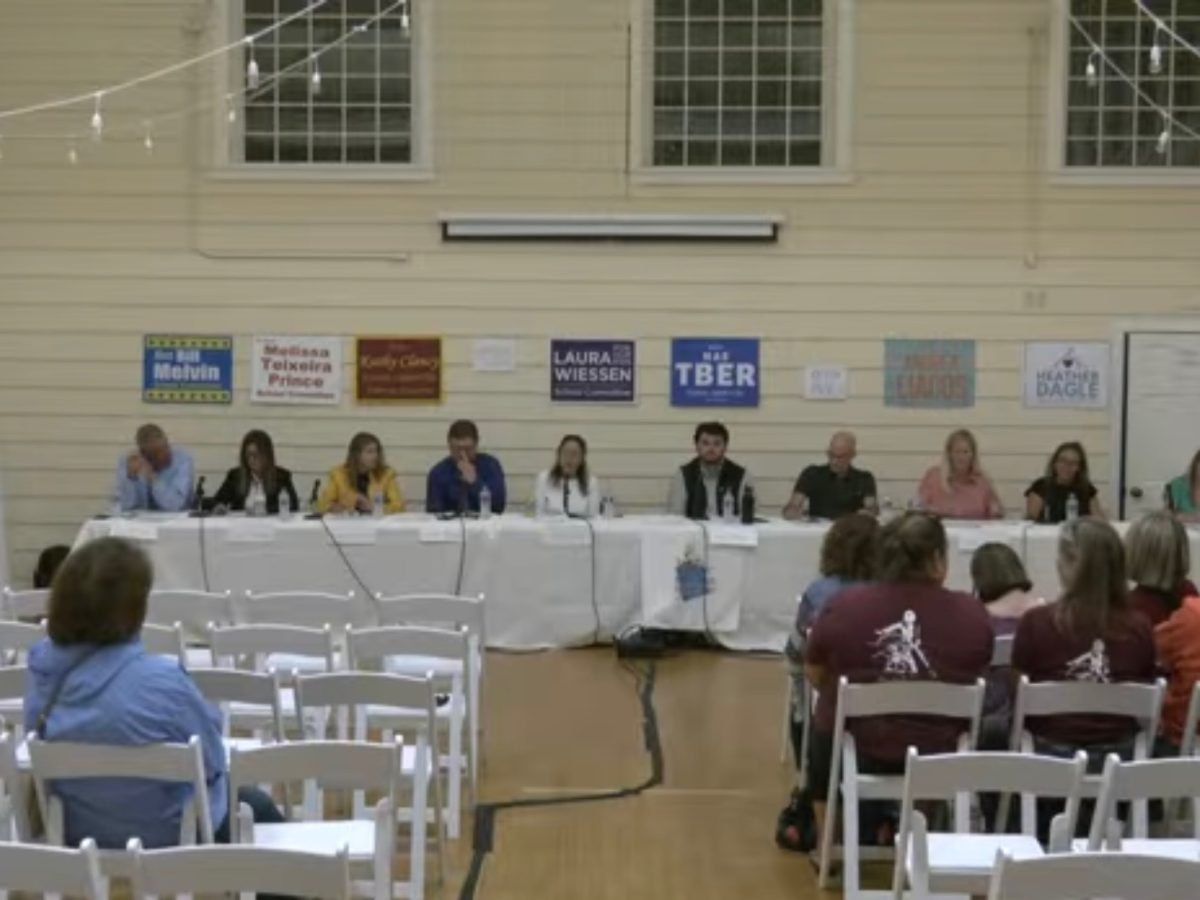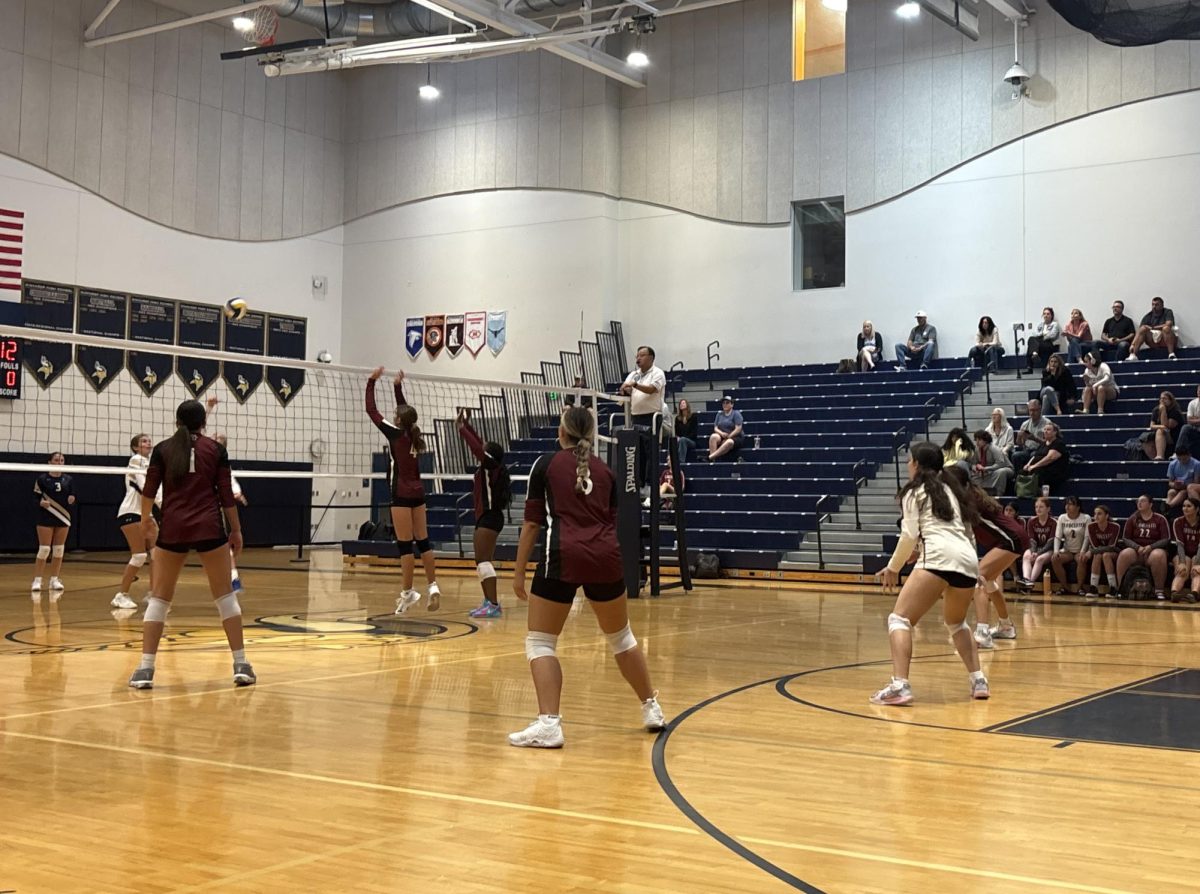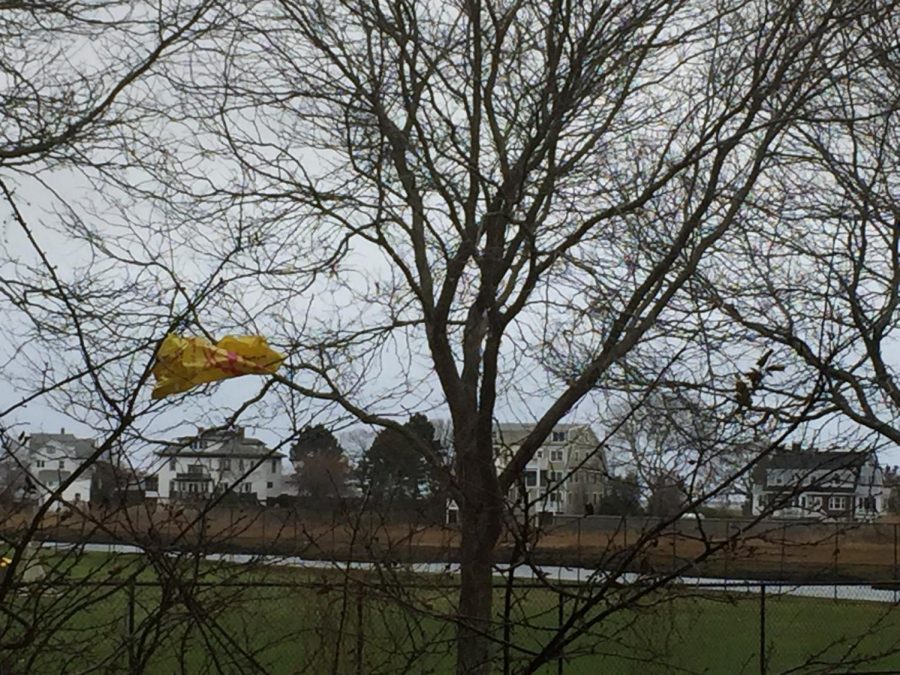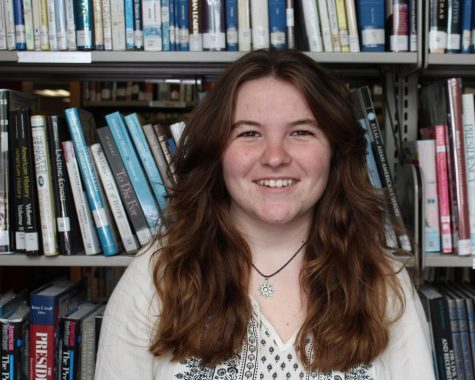What the plastic bag and polystyrene ban really means for Gloucester
A plastic bag hangs from a tree outside GHS
November 16, 2017
While convenient and cheap for consumers and businesses alike, plastic bags and polystyrene products are a direct threat to Gloucester’s well-being, reports Gloucester High’s environmental issues class.
“The Rozalia Project, in collaboration with Maritime Gloucester, used a remotely operated underwater vehicle and found an abundant amount of plastic bags and polystyrene cups lying on the ocean floor in the harbor,” said the class.
“If plastic bags continue to stay in use, by 2050 the oceans will contain more plastic than fish,” they continued, citing a study by the Ellen MacArthur Foundation.
Through the support of these youth and many others in the community — and a 7-1 City Council vote in favor of a plastic bag ban Tuesday night — Gloucester looks towards a new era of consumerism and environmental conservation.
The vote was postponed during a September 12th meeting due to several mistakes in the proposed ordinance, as well as concerns council members had over the enforcement of the ban. However, a ban on polystyrene plastic was passed that same night in a 7-2 vote.
Retailers have until January 1st, 2019 to phase out the use of plastic bags and polystyrene plastics. If retailers continue to use plastic bags after this date, they will be issued a warning for their first offense and a $50 fine for each violation after. Single use bags, such as those used for produce, are still allowed.
Twenty members of the community spoke in favor of the ban at the September 12th public hearing, while only four spoke against.
“This is one step closer to a cleaner, more attractive city,” said Clean City Commission member Ainsley Smith at the hearing. “This is a step Gloucester should and can take.”
Plastic’s harmful choke-hold on the ocean
Many locals have noticed the influx of trash on Gloucester’s beaches and streets throughout recent decades.
“I was motivated because of all of the plastic that washed up on shores, so I did my own research,” said Karen Ristuben.
Ristuben and a group of marine scientists traveled on a research boat in the Pacific from Hawaii to Vancouver in an effort to track the effects of plastic waste. They used a trawl system to pick up samples of the top 12 inches of soil in the ocean every time they were 2,000 miles from any landmass.
“There was plastic in every sample we picked up. Billions of tons of plastics are floating in the oceans around the planet,” said Ristuben. “Plastic bags and polystyrene can’t be recycled or composted. The only way to stop the problem is by reducing use of plastics and have manufacturers of plastics provide good alternatives.”
According a new study published on July 19th in the peer-reviewed journal Science Advances, 91 percent — or 6.3 billion metric tons — of plastics are not recycled and become waste. Much of this waste ends up in the ocean.
Eric Magers, a member of Gloucester’s Clean City Commission, cited a September 7th report to the council that states 94 percent of U.S drinking water has plastic in it.
“Once micro-plastics are in the ocean’s soil, they cannot be removed. It’s poisoning the ocean,” Laura Richane stressed to the council as she held her baby daughter. “I don’t want to leave a mess for her to clean up.”
Pilar Davis, Atticus Anderson, and Meadow Anderson — three young children who made a poster to present at the hearing — claimed that 100,000 sea animals die every year because of plastic in the ocean.
“Five years ago, I was snorkeling in the Caribbean and saw a turtle looking at a plastic bag and dove down. I took the bag away before it could get it,” said Jamie Mathison. “My sister and I work to collect trash, and we find a lot of polystyrene products and plastic bags.”
Ian Kerr, Chief Executive Director of Ocean Alliance, stressed that this type of incident is no coincidence.
“A lot of plastics break down and release phthalate, which has an odor that fish are attracted to,” said Kerr. “The fish eat plastic because they think it’s food.
“I brought my organization to Gloucester because of the city’s reputation for its innovation and creativity,” he continued. “There is a blue economy ahead and the city has an opportunity to lead rather than follow.”
The economic effects plastic bags and pollution have on Gloucester
Mathison is the owner of One Ocean-One Love Shop, and claims not using plastic bags is not a problem for her business.
“My businesses in Gloucester and Rockport don’t use plastic bags and it has never been an issue for us,” said Mathison. “It has never affected our cost of doing business.”
Brad Verter from Mass Green Network reports that in Gloucester alone, local retailers spend $611,478 per year on plastic bags. About 15.3 million bags are used in Gloucester annually.
Seaside Cycle in Manchester said that while paper bags are more expensive, it hasn’t negatively affected business and customers haven’t complained about the switch.
Other retailers have given similar statements, but how the plastic bag ban will affect the margins of businesses and certain individuals is still a concern for many.
Current City Council President Joseph Ciolino recused himself from the vote on the ban, as he owns a Main Street gift shop that uses plastic bags.
Speaking as a concerned business owner during the hearing, Ciolino stressed that paper bags do not hold up well in the rain and can be burdensome for the elderly and disabled to carry, as they often are packed with more items.
“As a retailer, this type of ban will create a hardship,” Ciolino said.
Other cities and towns have adopted models to help businesses make up for the extra money spent on reusable and paper bags, as well as assist those who cannot afford to buy reusable bags.
“In San Francisco, the retailers keep the five cents from the sale of reusable bags,” said Mary Flaherty, a Gloucester resident who used to live in San Francisco. “People using WIC funds do not have to pay for the reusable bags.”
Ainsley Smith noted that the Clean City Commission’s plans to purchase reusable bags for the Open Door Food Pantry and Senior Center to give out if they receive a $1,000 grant they’ve applied for.
As Smith recalled, Pollution affects both the tourism and fishing industries. If the oceans are not kept clean, the beauty of Gloucester and the well-being of sea-life cannot be preserved.
“An ocean of plastic litter does not support healthy fisheries,” said Smith. “As a coastal city whose economy relies greatly on the ocean, the city has a responsibility to take care of the resource that provides so much– fishing, whale watching, eco-tours, and beaches.
Many are worried that polluted oceans will turn off tourists, who usually come to Gloucester for its coastal beauty.
“Tourists are noticing and being affected by this pollution. The most asked question at Maritime Gloucester is what happened to all the mussels and the ocean life visitors normally saw in the recent past,” said Hannah Sargent, a volunteer at Maritime Gloucester. “Climate change, population growth, and pollution from plastic bags is the main cause.”
Gloucester is listed as one of the top five places in the world for whale watching, and attracts 75,000 whale watchers a year. This will not be the case if the ocean is heavily polluted.
“If we are not behind protecting our oceans, no one else will be,” said Heather Dagle.
Why crackdown on litter does, and doesn’t work
Cities across the world have eliminated litter immensely since the late 20th century. Communities look neater, rivers are cleaner, but the ocean is still being stuffed with trash and pollution.
“I respect those who are in favor of the ban, but I think it’s more of a litter problem,” said Bob Whynott, who spoke against the ban.
Eight million tons of plastic trash leak into the ocean each year, according to a study by the Ellen MacArthur Foundation. Despite efforts to fine litterers more harshly and keep the environment clean, this number continues to get worse.
“Cleaning up litter while litter is still being produced is like cleaning up a bathroom floor when the tub is still overflowing,” said Smith.
The city continues to monitor littering and prevent it from getting worse. But, many see the plastic bag and polystyrene bans as new and more effective ways to curb this ever-present problem, even if they come with some drawbacks.
“Even though plastic bags are more cost efficient in comparison to paper, they cause far more damage to our environment,” said the GHS environmental issues class. “With a slight change in our behavior and selection of materials within local businesses, these impending consequences affect not only our generation, but the generations to follow. It is up to us, as representatives not only of our class but of our generation, to make a change before it is too late.”











![The GHS/MERHS senior cross country runners pose together on Senior Night. [Photo courtesy of Manchester-Essex Athletics]](https://thegillnetter.com/wp-content/uploads/2025/10/Screenshot-2025-10-10-at-11.18.29-AM.png)




















Katie M • Nov 20, 2017 at 4:36 am
Great article. Very informative.
Eileen Jermyn • Nov 19, 2017 at 11:58 am
Does anyone know what year they started using plastic bags?I know when i was a kid and went to Cape Ann Market on Railroad Ave they had paper bags.